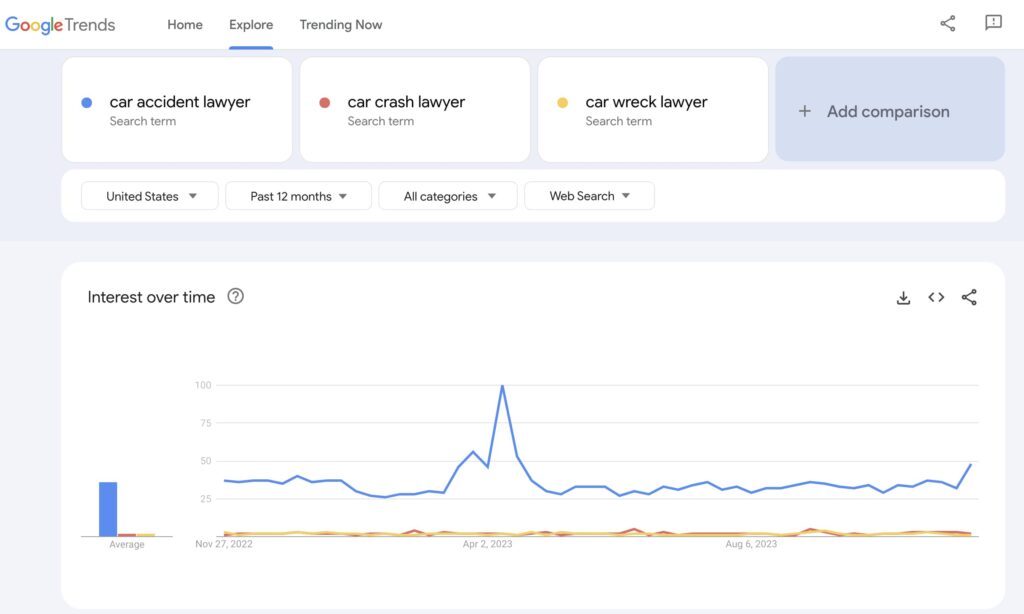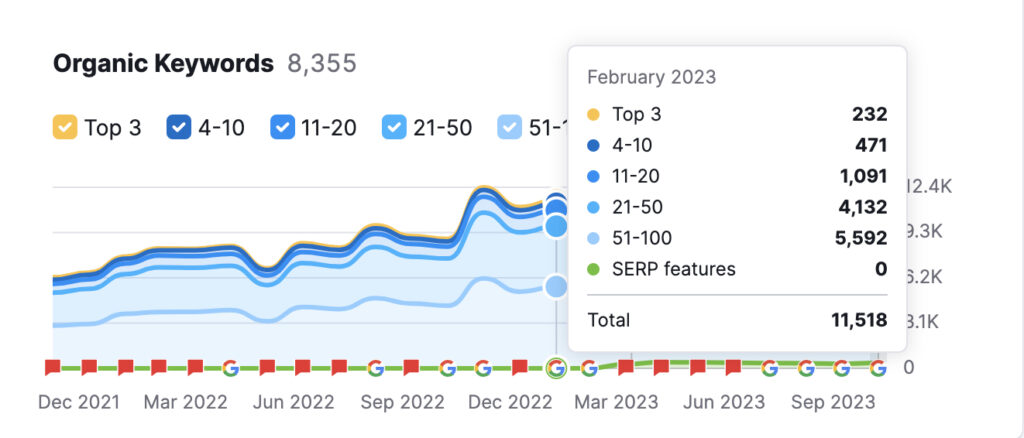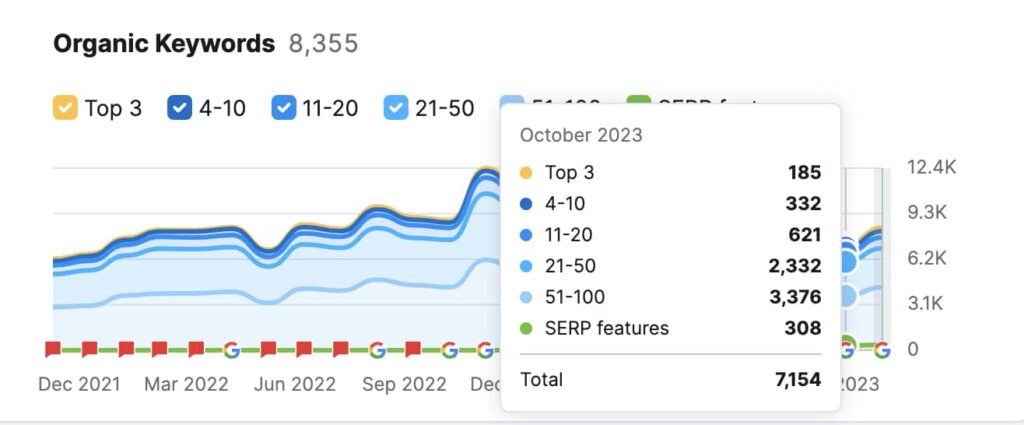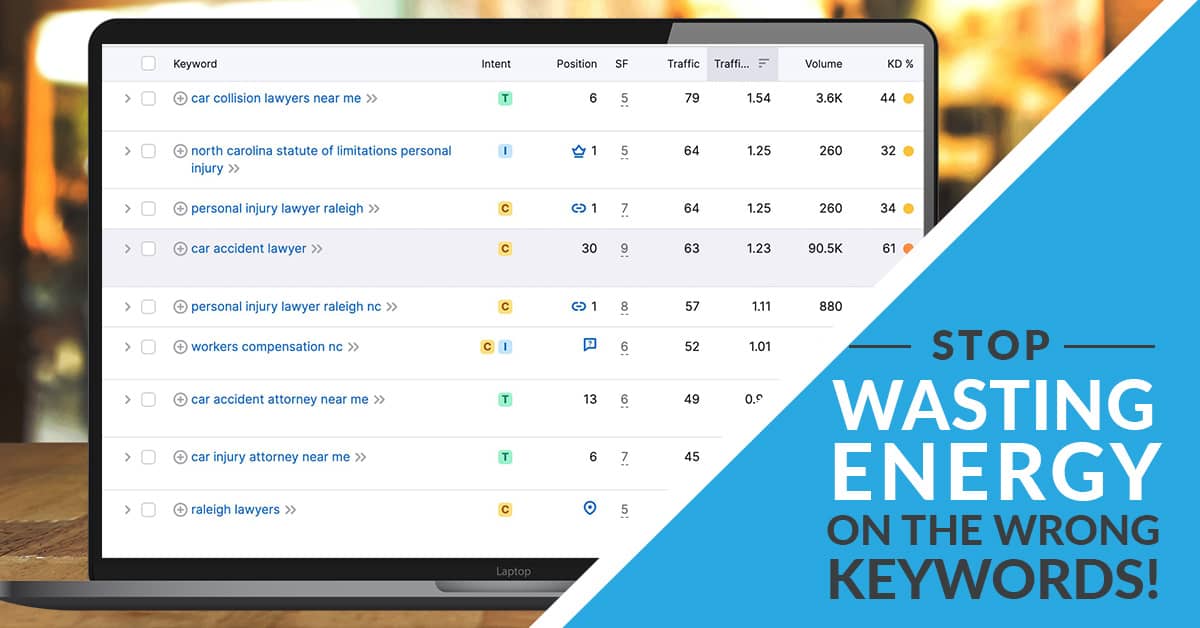How Fixating on the Wrong Keywords Kills Your SEO Strategy
6 Minute Read
A killer keyword strategy is essential for SEO. For your business to succeed, you need to rank on the first page—ideally in the first position—for multiple keywords associated with your products and services.
Everyone and their brother wants to rank for the competitive keywords within their industry that reel in leads and sales. But what many people don’t realize is that choosing your keywords is both art and science.
We often see businesses and agencies making assumptions about how people search. Bad assumptions make for a bad keyword list, which leads to—surprise—a bad keyword strategy.
The SEO virtuosos at Twelve Three Media are here to set the record straight on what it takes to rank. Namely, we’re going to show you how focusing on the wrong keywords can sabotage your efforts to dominate the Search Engine Results Pages (SERPs).
How Can I Find Keywords?
Search marketing agencies like ours take two major considerations into account when designing a client’s keyword list:
- What the client does (this goes to keyword relevancy).
The services and products you offer form the foundation of your keyword strategy. - Search volume.
Different tools may call it different things, but the term “search volume” simply refers to the number of times someone searches for a given keyword in a particular time period.
There are a number of tools you can use to create a list of lucrative keywords. AnswerThePublic is a good choice for newbies:

While SEO pros use more advanced platforms like Semrush:

Search volume is an important consideration. The more people who search for a particular keyword, the greater the opportunity to drive visits to your website (and, ultimately, business) when you rank on the first page.
However, your keyword list should be precisely targeted to what you do and where you are. You may own a fine dining restaurant in Las Vegas (the U.S. city with the highest search volume around the keyword “fine dining restaurant”), and being the first result people see in search will almost certainly lead to a lot of bookings. But achieving that #1 ranking can be difficult in a competitive market, and not all customers will search for a “fine dining restaurant”.
That is why we recommend a mix of competitive keywords and more specific terms with less search volume. A varied keyword strategy maximizes the likelihood of ranking across multiple queries, from top-tier to low-hanging fruit.
Read More: How to Drive Traffic with Low-Hanging Keywords
When Keyword Lists Go Wrong
Established businesses in competitive industries can get pretty SEO-savvy. That’s a good thing; as agency marketers, we want our clients to be involved in their keyword strategy so we can ensure that our search marketing efforts are on target and meeting each client’s goals.
What these owners and in-house marketers sometimes forget, however, is that SEO is about satisfying the searcher’s needs, not just what a particular business is looking to push.
Car Accident Lawyers: A Case in Point
Twelve Three Media is known as a first-rate marketing agency for personal injury law firms. We know the legal marketing landscape inside and out, specifically when it comes to pushing our clients’ websites to the top of the SERPs.
One of the stranger changes we’ve seen in how lawyers market themselves is increased hair splitting when it comes to keywords like “car accident lawyer”. Multiple clients have expressed a desire to target alternative terms like “car crash lawyer”, “car wreck lawyer”, etc. The thinking behind this change usually goes something like this:
“‘Accident’ implies that nobody’s at fault, whereas ‘crash,’ ‘wreck,’ etc. make it sound like somebody is to blame.”
While the thought process is clear enough, the fact is that “car accident lawyer” is the keyword people search—the alternatives don’t even come close:

Now, this is not to say that optimizing for related and alternative keywords is a lost cause. Far from it, in fact, because using different keyword variations is a great way to optimize your content for different ways people search.
But the point is to not get lost in the weeds. The priority keywords should always be the queries users search the most. These are the terms people associate with your industry, and they’re the terms they will search when they need your services or products (in this case, hiring a lawyer). If you don’t rank for the big keywords in your local market, you’re going to lose out on business.
Download Dominate in Search – SEO Essentials for Law Firms for FREE!
How a Bad Keyword Strategy Can Poison a Marketing Relationship
In the previous example, we saw how focusing on keywords with lower search volume can lead to suboptimal SEO results. Now let’s look at a real-world example of how a myopic focus on just a couple of keywords can destroy an otherwise positive relationship between a client and its agency.
Our client was fixated (that’s really the only word for it) on ranking #1 for two and only two keywords:
- “car accident lawyer”
- “Raleigh car accident lawyer”
These are important keywords, no doubt about it. In Raleigh, the term “car accident lawyer” has a search volume of 320.

“Raleigh car accident lawyer”, meanwhile, has a search volume of 90.

Nothing to sneeze at, but neither of these terms is the be-all end-all when it comes to dominating search in the local community. Our keyword strategy for this client was much broader, encompassing a multitude of terms surrounding various types of personal injury cases so we could maximize rankings across a broad swath of queries (including car accident keywords).
We achieved outstanding results for this client. At the height of our relationship, their website was ranking in the top 3 search results for more than 230 keywords and on the first page of the SERPs for a further 470 terms.

Unfortunately, the client was not satisfied with the keyword strategy as a whole unless we maintained the #1 ranking at all times for “car accident lawyer” and “Raleigh car accident lawyer”. This is a virtual impossibility given Google’s regular updates and the significant shift in rankings that often follow.
After parting ways, we continued to keep an eye on their “keyword strategy.” Sadly, the firm’s website saw a significant decline in SEO performance, with a massive drop in first-page rankings and much lower keyword appearances in the SERPs overall.

Building the Best Keyword Strategy
Our SEO maestros have learned a lot over the years. We’ve seen countless Google core algorithm updates, so-called best practices come and go, and clients with wide-ranging goals for their search marketing. Keyword lists remain an important tool for tracking performance, but you’re never going to win if you start with the wrong approach.
Here’s some pro tips to start your keyword strategy right:
- Focus on goals. The keywords you choose should be precisely targeted to drive first-page rankings, organic search traffic, and conversions based on your most important products and services.
- Understand search volume. If you don’t know how many people are searching particular keywords in your geographic area, you might end up targeting queries that won’t help you reach your business goals.
- Try more general keywords. Don’t get too hung up on the nitty-gritty of the keywords you target. Trying to track every conceivable variation of your keywords is a recipe for failure. Instead, start with a manageable list that represents your priorities, then make adjustments as needed.
- Stop obsessing. We’ve seen clients check their rankings every day. STOP IT. The more you Google yourself or fixate on how you’re ranking for a few particular keywords, the less successful your SEO strategy is going to be.
- That said, you should hold your agency accountable for better rankings. Our favorite clients are the ones who partner with us to identify their goals, discuss the results, and find new ways to do even better.
- TRACK RESULTS. This one’s all-caps because it’s the oft-forgotten culmination of a keyword strategy. Some agencies take a fast-and-loose approach to tracking keywords and reporting results to their clients, resulting in understandable confusion and frustration. Your marketing agency should be well-versed in analytics and reporting, and they shouldn’t be shy about showing their work.
Our goal is to achieve kick-ass results for our clients AND educate them on what ranking for specific keywords means for their business. Ideally, we want clients to report back on how topping the SERPs is affecting their leads, sales, and the bottom line.
Is your SEO marketing strategy dead in the water? Not sure what you should be ranking for or why search isn’t helping you reach your goals? Experts at Twelve Three Media can help you get your keyword list together, create an awesome keyword strategy, and start boosting those rankings!
